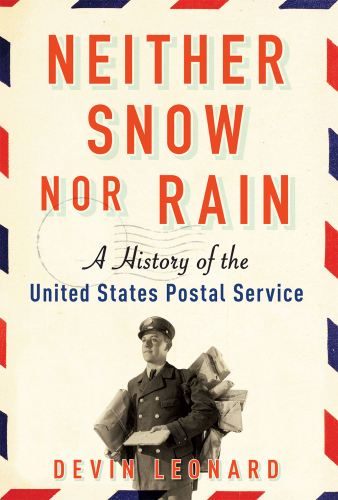
Neither Snow Nor Rain
A History of the United States Postal Service
کتاب های مرتبط
- اطلاعات
- نقد و بررسی
- دیدگاه کاربران
نقد و بررسی

June 13, 2016
Leonard, a staff writer at Bloomberg Businessweek, briskly and ably revisits the origins of the U.S. Postal Service and traces its myriad changes up into the 21st century. He covers the institution's major figures, including founder Benjamin Franklin, who introduced home delivery; President Benjamin Harrison, who first suggested the ideas of rural delivery and a postal bank (ideas that respectively came to fruition under the Theodore Roosevelt and Taft administrations); Anthony Comstock, a zealous anti-vice crusader; and Winston Blount, Nixon's postmaster general and the man who made jobs merit-based at the USPS, long a bastion of patronage. Of note are the chapter on the introduction of air delivery, which features anecdotes of the enormous risks early postal pilots took, Leonard's recounting of the short but devastating postal strike of 1970, and his examination of how the USPS has survived significant challenges from both private delivery companies and the growth of online bill-paying. What currently helps keep the USPS afloat is delivering about 40% of Amazon's packages. Readers may expect is an institutional history of a vast governmental organization (now a semi-private corporation) to be a bit dry, but Leonard is a sure-footed writer who has produced a well-researched work that uncovers some colorful characters and reflects basic dynamics of American democracy. Agent: Adam Eaglin, Elyse Cheney Literary.

March 1, 2016
How America got mail. In his lively debut history, journalist Leonard, a staff writer at Bloomberg Businessweek, chronicles the evolution of the nation's postal service through the many colorful, sometimes eccentric, personalities that shaped it. The author begins with Benjamin Franklin, who served under the British crown, overseeing postal service finances from London. After the Revolution, Franklin became the first postmaster general, a job he quickly left to become America's ambassador to France. Nevertheless, Franklin and George Washington shared the conviction that the postal service could "be a force that promoted enlightenment, circulating newspapers and political documents that would guard the public from tyrants and demagogues spreading misinformation." In addition, mail delivery could create a sense of connection among distant towns in the growing nation. When Alexis de Tocqueville visited in 1831, he praised the postal service as "the great link between minds." Although there were more than 20,000 miles of post roads by the turn of the 19th century, the cost of sending letters was high, and many communities were not served, spurring competition. Henry Wells, the founder of Wells Fargo, began a delivery company in 1841; for 18 months, the Pony Express--later celebrated and romanticized--offered delivery, on horseback, in California. Free home delivery began in 1861, a much-applauded innovation, although during Arthur Comstock's long reign as special postal inspector, the content of those deliveries was subject to investigation for obscenity. Philadelphia department store owner John Wanamaker emerges as a hero, pushing for reforms such as rural free delivery and parcel post. It was so cheap to send a package that some parents affixed stamps to their children for delivery to relatives rather than buy train tickets. Air mail, the rise of unions, financial troubles, zip codes, and the phenomenon of "going postal" are all subjects of Leonard's brisk, informative narrative. A spirited look at the business and impact of delivering mail.
COPYRIGHT(2016) Kirkus Reviews, ALL RIGHTS RESERVED.

April 15, 2016
Journalist Leonard uses a dozen episodes in the history of the U.S. Post Office (USPS) to illustrate the changes this far-reaching agency has undergone and how the beginnings of the service reflected the development of the country. Some of the incidents Leonard focuses on relate to what he calls "interlopers" attempting to usurp postal activities and how the USPS prevailed. Other occurrences reflect particular challenges within the service itself, from political and social interference to the trials of internal leadership and organization. Still, more highlight technological adoption and adaptation that enabled the organization to change with the times. Leonard writes at length about postal horsemen in the 19th-century American West and colorful pilots in the early 20th century who risked their lives to deliver packages. Franklin Roosevelt's well-known philatelic interests brought the lowly postal stamp to greater national attention and spurred the development of profitable commemorative stamp issues. The author also details the recent challenges of electronic mail and violence by some postal employees. VERDICT Although much of Leonard's coverage may enlighten readers, the overall effect will leave others wanting a more successful narrative of postal history, now available in Winifred Gallagher's How the Post Office Created America, reviewed above.--Charles K. Piehl, Minnesota State Univ., Mankato
Copyright 2016 Library Journal, LLC Used with permission.

























دیدگاه کاربران